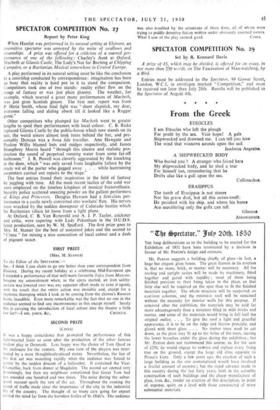SPECTATOR COMPETITION No. 27
Report by Peter King When Hamlet was performed in its natural setting at Elsinore, an insensitive spectator Was annoyed by the noise of swallows and steamships. A prize was offered for a criticism of a marred per- formance of one of the following : Charley's Aunt at Oxford, Macbeth at Glamis Castle, The Lady's Not for Burning at Chipping Campden, or a Ruritanian Musical somewhere in Central Europe.
A play performed in its natural setting must be like the conclusion to a courtship conducted by correspondence: imagination has been so busy that reality is hard put to it to stand the comparison. Competitors took one of two stands: reality either flew on the wings. of fantasy or was just plain gloomy. The weather, for example, which marred a great many performances of Macbeth, was just grim Scottish gloom. The best met. report was from P. Hertz Smith, whose final fight was " sheer slapstick, my dear, everyone falling and sliding about till it looked like a Rugger game."
Other competitors who plumped for Macbeth went to greater lengths to spoil their performances with local colour. C. B. Ricks replaced Glamis Castle by the public-house which now stands on its site; the weird sisters almost took turns behind the bar, and pre- sumably Duncan was a bona fide traveller. Ann Howgate ' and Pauline Willis blamed- bats and -midges respectively, and James Humphrey Morris heard " through this sincere and realistic pro- duction the sound of perpetual running water from some far-off bathroom." J. R. Powell was cleverly aggravated by the knocking at the door, which " was only saved from laughable failure by the ready wit of the porter who gagged away . . . while hammering carpenters carried out repairs to the stage." - The best entries found their inspiration in the field of fantasy by juggling with time. All the most -recent tactics of the cold war were employed on the timeless kingdom of musical Ivanovellania. Security police scattered sneezing powder on the gallant performers of Kings and Princesses. Douglas Hawson had a first-class per- formance in a castle newly converted into workers' flats. His nerves were wrecked by the sudden downpour of Colorado beetles -which his Ruritanian villain let loose from a light plane.
At Oxford, C. B. Van Ryneveld and A. J. P. Taylor, cricketer and critic, were capering with Lady Pakenham in the O.U.D.S. latest production, seen by W. M. Spafford. The -first prize goes to Mrs. M. Stanier for the best of sustained jokes and the second to " Cinna " for mixing a nice concoction of local colour and a dash of piquant sauce.
FIRST PRIZE (MRS. M. STANIER)
To the Editor of the SPECTATOR: — SIR,—I think I can claim to go one better than your correspondent from Elsinore. During my recent holiday at a celebrated Mid-European spa 1 attended a performance of-that well-worn favourite Tales from Moscow. Imagine my astonishment when, as the opera started, an iron safety- curtain was lowered (nor was any apparent effort made to raise it again), with the result that the entire action was invisible and, except for a rhythmic thumping which I took to be coming from the chorus's Russian boots, inaudible. Even more remarkable was the fact that no one in the audience seemed to find any inconvenience in this except myself. Surely this is carrying the introduction of local colour into the theatre a little too far?—I am, yours, &c., CRITICUS.
SECOND PRIZE (CINNA)
IT was a happy coincidence that prompted the performance of this light-hearted farce so soon after the production of the other famous student play in Denmark. Less happy was the choice of Tom Quad as the enclosure for the venture. My own view of the players was inter- rupted by a most thoughtlessly-placed statue. Nevertheless, the fun of the first act was mounting rapidly when the audience was forced to scatter by the sudden descent of a helicopter. It contained the Vice- Chancellor, back from dinner at Magdalen. The second act opened very promisingly, but then my neighbour complained that Great Tom had just sounded one hundred and two times. The noise during the subse- quent recount spoilt the rest of the act. Throughout the evening the sound of traffic made clear the importanceof the city in the industrial life of the country. The thought of so litany cars going for export carried the mind far from the harmless frolics of St. Olde's. The audience was also troubled by the attentions of three dons, all of whom were trying to peddle detective fiction written under obviously assumed names.
What I saw of the play seemed good. CINNA.


































 Previous page
Previous page